
In today’s fast-paced global marketplace, the logistics industry faces increasing pressure to improve efficiency, reduce costs, and enhance service quality. For freight forwarders in Vietnam, where the economy is rapidly growing and competition is intensifying, embracing innovative technologies is not just an option—it’s a necessity. One such technology that is revolutionizing the way freight forwarders operate is Radio Frequency Identification (RFID).
In this article, we’ll explore how RFID solutions from TradeLink Technologies can transform freight forwarding operations, offering enhanced visibility, improved accuracy, and streamlined processes that lead to significant business advantages.
Understanding RFID technology
Before delving into the specific applications of RFID in freight forwarding, it’s essential to understand what RFID technology is. At its core, RFID uses electromagnetic fields to automatically identify and track tags attached to objects. These tags can be passive (no battery, activated by a reader’s signal) or active (battery-powered, allowing for longer-range tracking).
RFID systems consist of three key components:
1. RFID tags: These contain a microchip that stores information about the item and an antenna that transmits this information to RFID readers.
2. RFID readers: Devices that emit radio waves and receive signals from RFID tags, decoding the information stored in the tags.
3. Middleware: Software that processes the data collected by the readers, allowing businesses to manage and analyze inventory in real time.
The benefits of RFID in freight forwarding
1. Enhanced visibility
Visibility is crucial in freight forwarding. Knowing the precise location of shipments can drastically improve decision-making processes. RFID technology provides real-time tracking capabilities, enabling freight forwarders to monitor the status of their shipments throughout the supply chain.
For example, with RFID, freight forwarders can track the movement of cargo from the moment it leaves the warehouse to its final destination. This level of visibility allows for timely updates to clients, reduces the likelihood of lost or misplaced items, and ensures that operations can adapt quickly to any delays or issues.
2. Improved accuracy and reduced errors
Manual processes in logistics, such as barcode scanning, are prone to human error. With RFID, the automation of data capture minimizes the risk of mistakes. RFID systems can read multiple tags simultaneously, significantly speeding up inventory checks and shipment processing.
TradeLink Technologies’ RFID solutions allow freight forwarders in Vietnam to conduct rapid inventory audits without the need to manually scan each item. This improved accuracy leads to fewer discrepancies, enhanced accountability, and greater customer satisfaction.
3. Streamlined operations
The logistics industry thrives on efficiency. RFID technology streamlines various operations, including:
– Inventory management: RFID enables real-time inventory tracking, helping freight forwarders maintain optimal stock levels and reduce excess inventory costs.
– Order fulfillment: Automated processes help speed up order picking and packing, reducing lead times and ensuring timely deliveries.
– Warehouse operations: RFID can simplify warehouse management by improving the accuracy of put-away and retrieval processes, optimizing space utilization, and enhancing overall workflow.
4. Enhanced customer service
In the logistics industry, customer service is paramount. Clients expect real-time updates and quick responses to inquiries. With RFID technology, freight forwarders can provide precise tracking information, enabling better communication with clients and fostering trust and loyalty.
Furthermore, the ability to quickly resolve issues and provide accurate delivery timelines enhances the overall customer experience, setting freight forwarders apart from competitors.
Implementing RFID solutions
Transitioning to RFID technology requires careful planning and execution. Here are key steps for freight forwarders in Vietnam to consider when implementing RFID solutions:
1. Assess current operations: Identify areas where RFID can provide the most significant impact. This could include inventory management, shipment tracking, or warehouse operations.
2. Choose the right RFID system: TradeLink Technologies offers a variety of RFID solutions designed for the logistics sector. Selecting the right system depends on the specific needs and scale of operations.
3. Integrate with existing systems: RFID solutions should seamlessly integrate with existing warehouse management systems (WMS) or enterprise resource planning (ERP) software. This integration allows for efficient data exchange and comprehensive reporting.
4. Train staff: Successful implementation hinges on ensuring that staff members are well-trained in using RFID technology. TradeLink Technologies provides training and support to help your team adapt to the new system.
5. Monitor and optimize: Once RFID systems are in place, continuously monitor their performance and look for opportunities to optimize processes further.
Real-world applications of RFID in freight forwarding
To illustrate the benefits of RFID technology, let’s explore some real-world applications relevant to freight forwarders in Vietnam:
– Port and terminal operations: RFID can streamline the check-in and check-out process at ports, reducing wait times and improving throughput. By automatically identifying containers and tracking their movements, freight forwarders can enhance logistics efficiency.
– Cross-border logistics: Vietnam’s strategic location as a trade hub means that cross-border logistics are critical. RFID solutions can simplify customs clearance processes by providing accurate documentation and reducing the risk of delays due to paperwork issues.
– Temperature-controlled shipments: For freight forwarders handling perishable goods, RFID tags equipped with temperature sensors can monitor conditions in real time, ensuring compliance with regulatory standards and maintaining product integrity.
TradeLink Technologies: Your partner in RFID solutions
As Vietnam’s logistics industry continues to evolve, TradeLink Technologies stands at the forefront, providing innovative RFID solutions tailored for freight forwarders. Our expertise in integrating RFID technology into logistics operations ensures that your business can maximize the benefits of this transformative technology.
Conclusion
The logistics landscape is rapidly changing, and RFID technology is a game-changer for freight forwarders in Vietnam. By enhancing visibility, improving accuracy, streamlining operations, reducing costs, and elevating customer service, RFID solutions from TradeLink Technologies empower businesses to thrive in a competitive market.
As you consider the future of your freight forwarding operations, embracing RFID technology may well be the key to unlocking new levels of efficiency and success. Contact TradeLink Technologies today to learn more about how our RFID solutions can help revolutionize your freight forwarding business. Together, let’s pave the way for a more efficient and prosperous future in logistics.
